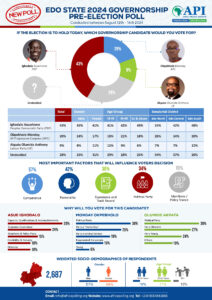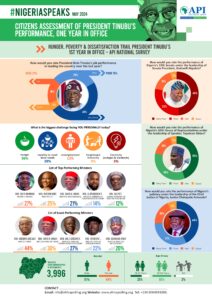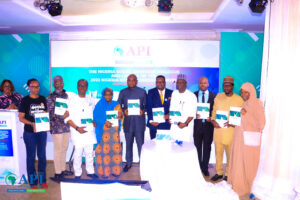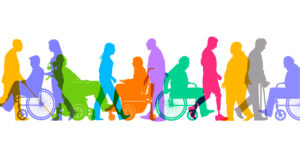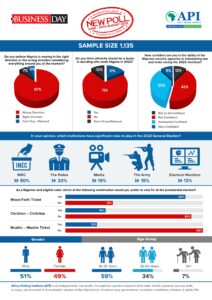Who we are
Africa Polling Institute is a non-profit, non-partisan independent opinion think-tank which conducts opinion polls, social research, and evaluation studies at the intersection of democracy and governance through policy engagement and advocacy. Our main objective is to produce and disseminate credible opinion research data to support better decisions, public policy, practice and advocacy in sub-Saharan Africa. We were established on the belief that citizens’ participation in democratic governance can deepen the democratic process, strengthen public institutions and promote social cohesion across Africa.
Background
Africa Polling Institute (hereafter referred to as API) with support from Ford Foundation is carrying out a project to understand and measure the state of Social Cohesion and Polarization in Nigeria. From 2019 to date, and with the support of Ford Foundation, API has undertaken three rounds of the Nigeria Social Cohesion Survey (NSCS)1. The Institute has also developed the Nigeria Social Cohesion Index (NSCI), which annually measures the state of social cohesion in the country from the perspective of indicators such as Identity, Trust, Civic Participation, Social Justice, Patriotism, Self-Worth, and Future Expectation. In 20212 the NSC Index was computed as 44.2%, below the average cohesion threshold of 50%. However, in 20223 the NSCI was computed as 39.6%, representing a 4.6% decline from 2021 and a further drift from the 50% benchmark.
Results from the series of national surveys have revealed cracks in the country’s social architecture, justifying why Nigeria had become increasingly disunited since its return to democracy in 1999, especially along the lines of ethnicity, religion, social status & political affiliation. In specific terms, results from the annual surveys revealed that while only 45% of citizens believed the country had become divided in 2019; by 2021, that statistic had spiked to 65%, a whopping 20 percentage point increase from 2019. Similarly, in 2022, 66% of citizens said they believe that Nigeria has become much more divided. Furthermore, the Institute organized a One-Day National Social Cohesion Dialogue in Abuja, bringing together several stakeholders to discuss the subject of Social Cohesion, especially in the light of survey findings from the #NSCS2021 & #NSCS2021 data respectively.
In addition, some pundits have argued that the build-up to Nigeria’s 2023 General Elections fueled some extent of disunity in the country, especially along ethnic and religious lines. The 2023 Presidential Election was an opportunity for political parties to present candidates with broad national appeal to citizens; however, issues of ethnicity and religion appeared to have been manipulated by some politicians to gain undue advantage over their opponents. The election witnessed a significant proportion of young Nigerians galvanized around the presidential candidate they considered as having the capacity to fix the issues facing the country, having pragmatic policy reform proposals, and being less corrupt. Nonetheless, the outcome
of the Presidential Election was received with mixed feelings and left the country somewhat divided. Similarly, the results of the Gubernatorial Elections, particularly in certain highly populated states like Lagos, Kano, and Rivers, further deepened divisions along ethnic lines (as in the case of Lagos) and political lines (as in the case of Kano and Rivers); with violence preventing citizens from fulfilling their civic duties.
Therefore, there’s a crucial need to continue to monitor and measure the state of social cohesion, and the extent of polarization in the country; in order to engage critical stakeholders, state and non-state actors, on how best to promote a socially cohesive nation.
Based on this background, API with support from Ford Foundation is embarking on the 4th Round of the Nigeria Social Cohesion and Polarization Project to yet again widen the focus and scope of the aforementioned study in Nigeria. The objective of this project is to measure and track the degree of Social Cohesion and level of Polarization post-election in Nigeria and to proffer insightful guidance into public policy formulation which will help strengthen Cohesion in Nigeria. Given the above, API is opening an expression of interest to recruit short-term Social Cohesion Research Fellows, with Doctorate Degree, with an in-depth understanding of the dynamics of social cohesion and the level of polarization in Nigeria. Candidates should be preferably from Nigerian Public Tertiary Institutions, with research experience in Social Cohesion, Polarization, Impunity, Social Exclusion, Corruption, Natural Resource Governance and Gender amongst other indicators. Candidates would be required to work remotely, with minimal travel. This project offers Academics and Researchers within Nigerian Public Tertiary Institutions, an opportunity to enhance their research capacity, especially in the area of engaging in rigorous policy-oriented research.
Women are highly encouraged to apply.
Application Duration
Open: Monday, July 1st, 2024
Closed: Monday 15th, 2024
Expectations
The Fellows will:
- Carry out an extensive literature review on social cohesion and level of polarization in Nigeria;
- Support the process of designing research methodology and developing survey instruments building up from the existing tools
- Publish working papers necessary from project milestones, and participate in stakeholders’ engagement;
- The fellows will be responsible for reporting survey findings using previous reports as a guide and other roles within the confines of the research project.
Qualifications
Interested researchers must possess the following: - Must be a PhD holder in any Social Science discipline (Preferably Sociology and Political Science);
- Extensive knowledge and experience in the area of Social Cohesion and Polarization in Nigeria;
- Relevant publications on Social Cohesion and level of Polarization as presented in the study background
- Proven record of being in a similar position and must possess exceptional management and organizational skills.
Submission List
Applicants must submit the following with their CV: - Curriculum Vitae (not more than 5 pages);
- A 1,000 Word write-up on the state of Social Cohesion and Polarization in Nigeria;
- Scanned copy of the candidate’s credentials; and
- A Letter of Motivation.
Interested applicants should submit their applications as stated in this EOI to info@africapolling.org or africapolling@gmail.com
For further clarifications on this EOI, please contact Mr Segun Olajonrin via Email: solajonrin@africapolling.org

